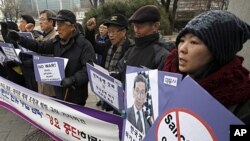South Korea, the world's fifth largest importer of oil, says more discussions are necessary before it can make a decision on cutting purchases of Iranian crude oil. The United States is hoping its ally will join the sanctions campaign meant to put pressure on Iran to rein in its nuclear program.
The South Korean government finds itself in a dilemma regarding Iran.
As a meeting got underway Tuesday with American officials here, the South Korean deputy foreign minister, Kim Jae-shin, said that Seoul shares Washington's growing concern about Iran's nuclear development.
"[The] recent situation related to [the] Iranian nuclear issue has been getting worse since we met last month. But I assure you, once again, that the [South] Korean government is committed to strongly support and participate in international efforts to resolve this issue," Kim said.
But Kim also made clear that tougher action is controversial in South Korea. "Many Koreans are quite worried about that further strengthening sanctions against Iran at this time may destabilize the international market of crude oil and, accordingly, bring about some adverse effect on the [South] Korean economy as well," Kim stated.
The U.S. State Department's special adviser for non-proliferation and arms control, Robert Einhorn, is leading the American delegation to Seoul. He says the sanctions on Tehran will also send a message to North Korea, which is pursuing nuclear programs, as well, in defiance of international agreements.
"The ROK [South Korean] government is a global player in this regard. It knows that the situations in Iran and in North Korea are related. I think progress on one will help us achieve progress on another," Einhorn said.
The two Koreas have no diplomatic relations and have remained technically at war since three years of devastating combat in the early 1950s. The United States maintains more than 28,000 troops in South Korea to help defend it.
But South Korea is reliant on imports for all of its crude oil and 250,000 barrels a day arrive from Iran.
The U.S. team next visits Tokyo to apply the same pressure on another key economic and military ally in the region.
Japan, also heavily dependent on imported crude, has been sending conflicting signals about whether it will support further sanctions on Iran.
The sanctions are intended to pressure Tehran into serious negotiations over its nuclear program. A number of nations believe Iran is trying to develop nuclear weapons. The Islamic Republic contends its nuclear development is for peaceful purposes, not to make bombs.
US Asks South Korea to Cut Iran Oil Imports




